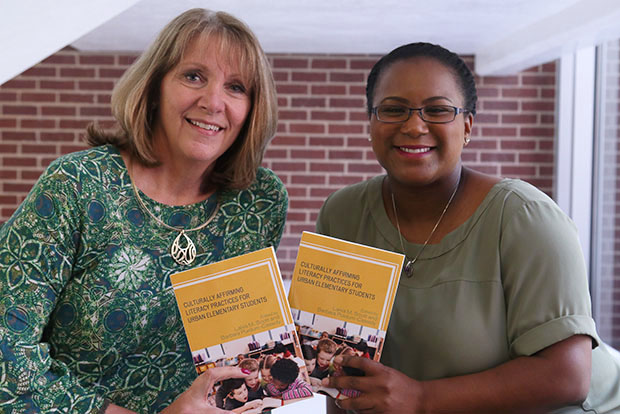After years of research and first-hand teaching experience with literacy in American public schools, two Baylor professors decided change was imperative. Assistant professors of curriculum and instruction in Baylor’s School of Education, Lakia Scott, PhD, and Barbara Purdum-Cassidy, EdD, compiled and edited “Culturally Affirming Literacy Practices for Urban Elementary Students,” a textbook about literacy gaps for pre-service and in-service teachers.
“There are few texts that address ways to teach and approaches to teaching specifically urban elementary students regarding literacy,” Scott said. “Dr. Purdum-Cassidy and I thought about this book as a way to provide a resource text for pre-service and early-career teachers.”
Scott and Purdum-Cassidy said the book encourages elementary teachers to recognize the value students bring from all cultural backgrounds. Both plan to use the textbook within their curriculum for undergraduate education courses at Baylor.
The inspiration for the book had roots in landmark words from the American National Commission on Excellence in Education. In 1983, “A Nation at Risk: The Imperative for Educational Reform,” was released, outlining the declining global competitive edge in American students. This report brought weaknesses within the education system to the attention of America.
“Even though ‘A Nation at Risk’ was written over 20 years ago, it still rings true today,” Scott said. “We’re not where we need to be.”
According to a 2014 report by The Washinton Post, ethnic and racial minority students now make up the majority of student populations in U.S. public schools. However, despite this increase in minority students, national polls over the past two decades show continual lower literacy levels for African-American and Hispanic/Latino(a) students than their White counterparts.
 Scott’s book introduction says, “This book extends the conversation for culturally affirming pedagogy by showcasing successful models for teaching reading and writing to urban students through a discussion of topics that foster culturally inclusive instruction through critical pedagogy and inquiry-based learning.”
Scott’s book introduction says, “This book extends the conversation for culturally affirming pedagogy by showcasing successful models for teaching reading and writing to urban students through a discussion of topics that foster culturally inclusive instruction through critical pedagogy and inquiry-based learning.”
“Culturally Affirming Literacy Practices for Urban Elementary Students,” published in August 2016, highlights the importance of moving past culturally responsive teaching to culturally affirming teaching. While culturally responsive teaching considers appropriate curriculum for students from various cultural backgrounds, culturally affirming teaching deeply recognizes those cultural capitals and places purposeful teaching value in what students bring to the classroom. These culture variations can include race, ethnicity, gender and socio-economic status, the authors say. Culture becomes the centerpiece of the classroom, rather than a curriculum accessory.
Purdum-Cassidy said, “I think we really need to take our students’ backgrounds, their cultures, their gifts, their motivations and their interests into consideration. When teaching, we have to know our students.”
After disseminating a call for proposals within the education field, Scott and Purdum-Cassidy chose 18 contributors. They asked for submissions covering topics of critical issues in teaching literacy, approaches to teaching reading and writing, multicultural literacy practices, and assessing and evaluating urban students.
In addition to collecting, evaluating and editing chapters, Scott and Purdum-Cassidy both authored chapters in the book. Scott wrote “Introduction: A Continued Era of Language Discrimination: Implications for Culturally Affirming Literacy Practices in Urban Elementary Schools,” and co-authored “‘StartedfromtheBottomNowWeHere’: Helping Educators to Empower Urban Students about Their Futures by Liberating
Them from Cultural Past,” with Marcia Watson. Purdum-Cassidy co-authored “Beyond Basic Instruction: Effective Civic Literacy Instruction in Urban School Settings,” with Karon LeCompte, PhD, assistant professor of curriculum and instruction.
Purdum-Cassidy said, “The goal for this book is to show teaching models that have been implemented successfully, even when there are stresses or constrictions of testing pressures or common-core state standards. We want to extend the conversation and provide teachers with a vision for new teaching methods.”
Scott and Purdum-Cassidy believe steps toward stronger public education do not stop with literacy. They hope to extend the conversation for culturally affirming pedagogy into a second book. This follow-up book will showcase successful models for teaching writing to urban students through a discussion of topics that include approaches to teaching writing, multicultural writing practices, early and elementary writing practices, and assessing and evaluating the writing of urban students.
— By Molly Meeker
For more news from Baylor School of Education, visit the Instant Impact home page.
ABOUT BAYLOR SCHOOL OF EDUCATION
Founded in 1919, the Baylor School of Education is accredited by the National Council for Accreditation of Teacher Education. The School prepares leaders beginning in undergraduate programs, continuing through master’s-level work and culminating in both Ed.D. and Ph.D. programs; impacts the world as students participate in faculty-guided fieldwork, service learning and community-focused research in local and global contexts; and shapes the future by mentoring the whole person, developing an understanding of theory and practice and encouraging responsiveness to one’s calling.
ABOUT BAYLOR UNIVERSITY
Baylor University is a private Christian University and a nationally ranked research institution. The University provides a vibrant campus community for more than 16,000 students by blending interdisciplinary research with an international reputation for educational excellence and a faculty commitment to teaching and scholarship. Chartered in 1845 by the Republic of Texas through the efforts of Baptist pioneers, Baylor is the oldest continually operating University in Texas. Located in Waco, Baylor welcomes students from all 50 states and more than 80 countries to study a broad range of degrees among its 12 nationally recognized academic divisions.

